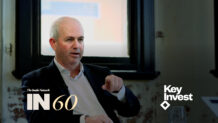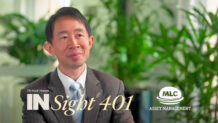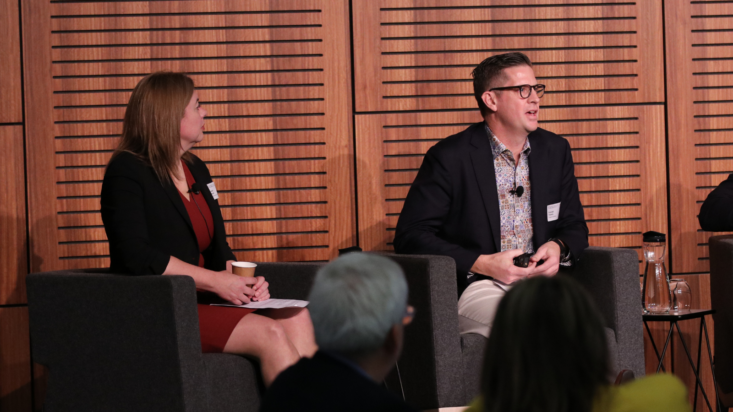Upfront advice tax deductibility a possibility mid-2023 after four years of consultation
Upfront advice fees may be on the cusp of proportional tax deductibility after the Financial Planning Association engaged with the Australian Tax Office on how it might consider updating the existing tax guidance to reflect a more modern view of financial advice.
The new guidance, which is slated to be released by the ATO in mid-2023, may provide clarity for financial advisers regarding the deductibility of upfront and ongoing fees – all without the need for legislative change.
Back in 2019, Tangelo Advice Consulting director Conrad Travers (pictured, right) had a conversation with then-FPA chief executive Dante De Gori about what it would take to bring about the deductibility of fees paid for upfront advice, which is typically considered as capital expenditure.
Legislative change was unlikely, they agreed, as this had been attempted many times without success. Instead, they focussed the argument around the existing deductibility principles from tax law within the ITAA 97 – the general deductibility rule (section 8.1), which broadly says that expenditure incurred in the course of producing income is deductible (subject to the capital exception), and the specific tax-related expenses rule (section 25.5), which suggests tax advice provided by a recognised tax adviser may be deductible as a cost of managing tax affairs.
The FPA then focussed on a collaborative approach with the ATO to consider revised guidance relating to the issue, which dates back to 1995 (TD 95/60).
Pivot to the guidance
Speaking at the Financial Advice Association Australia’s Sydney Congress this week on a panel hosted by current FAAA CEO Sarah Abood (pictured, left), Travers explained that while the two relevant rules had the potential to deem upfront advice tax deductible, that currently wasn’t the case because the ATO’s guidance on the issue (TD 95/60) contains an outdated perception of what modern financial advice really is.
Tax Determination 95/60 explains how the fee for drawing up the “investment plan” is incidental to the price of purchasing the investment and therefore considered a capital expenditure. In the ATO’s own words, “the expenditure is incurred at a point too soon to be regarded as incurred in gaining or producing assessable income, and is therefore a capital outlay”.
But that notion was conceived in 1995, said James Alsop, a tax professional who joined the panel discussion, when financial advice was less focussed on an individual’s financial situation, needs and objectives. That was before a series of high-profile regulatory reforms brought about more holistic advice practices.
“The guidance is very old… the way things operate today is very different to how they operated in 1995,” Alsop said. “And even more relevant, perhaps, is that the example in the determination specifically relates to a fee paid for drawing up an investment plan and then fees paid for managing or servicing that plan.
“Over time,” Alsop continued, “that has probably given rise to a practice or an understanding within the industry that upfront fees are typically not deductible, because they could potentially be more akin to a capital outlay versus the ongoing adviser fee, which is more generally accepted as being deductible where there is a nexus to income.”
New era, new interpretation
What started with initial discussions around how to approach the issue with the ATO in 2019 turned into real engagement during 2020, and then the ATO issuing a confidential discussion paper on the topic in 2021.
After more consultation with the FPA’s working group, the ATO announced it would release a new tax determination for targeted consultation in December 2022. Once it saw the draft of the new guidance, the FPA coordinated an industry submission providing feedback. The confidential consultation concluded in April.
According to Travers the ATO has indicated that it would like to have new guidance out by the middle of this year.
There are no guarantees, he said, but plenty of reasons to believe that this new determination will inform the community that upfront advice is not always a capital outlay on product.
One of those reasons is that the “upfront vs ongoing” fee distinction is an out-of-date concept. “It’s the convenient example as opposed to the real world example,” Travers said, noting that the ATO’s use of the phrase “too soon” in TD 95/60 doesn’t quite scan in the modern advice paradigm.
The very nature of advice is different almost 30 years after the original guidance was written. It is, by any measure, far less geared towards advising on investment products up front.
And crucially, Travers pointed out, advisers have all been through the Tax Practitioners Board requirements and are Qualified Tax Relevant Providers, which potentially brings them under the tax-related expenses rule.
If there’s a further point to be made, Travers said, it’s that the economic benefit of increasing the advice take-up would far outweigh the cost of additional deductions. CoreData research shows that if roughly half the adults in the country received financial advice the benefit to the economy would be in the order of $113 billion dollars. “The economic case is very strong as well.”











